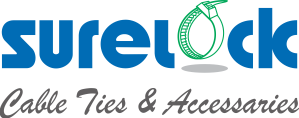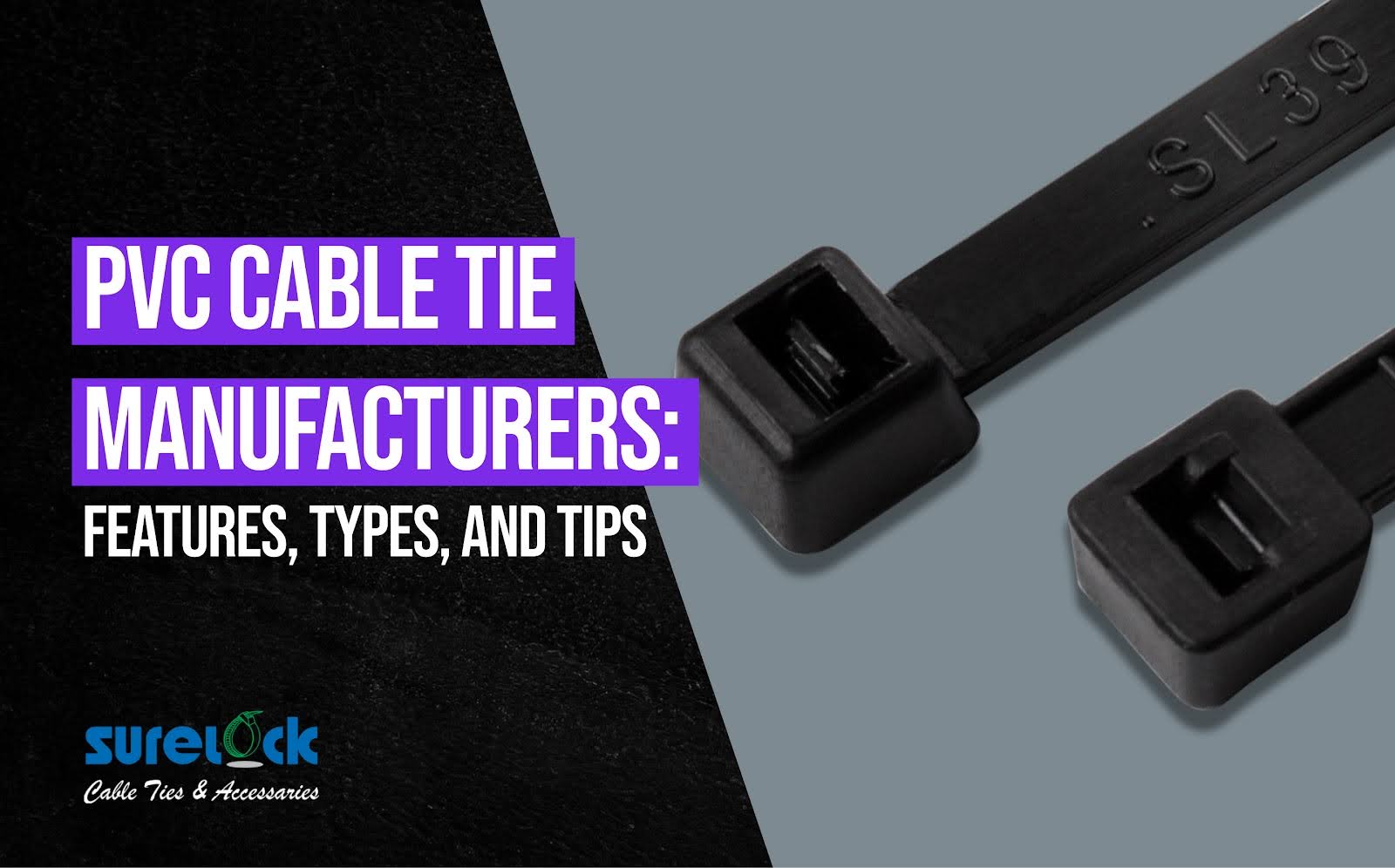Security Seals: Common Uses and Benefits
September 1, 2025
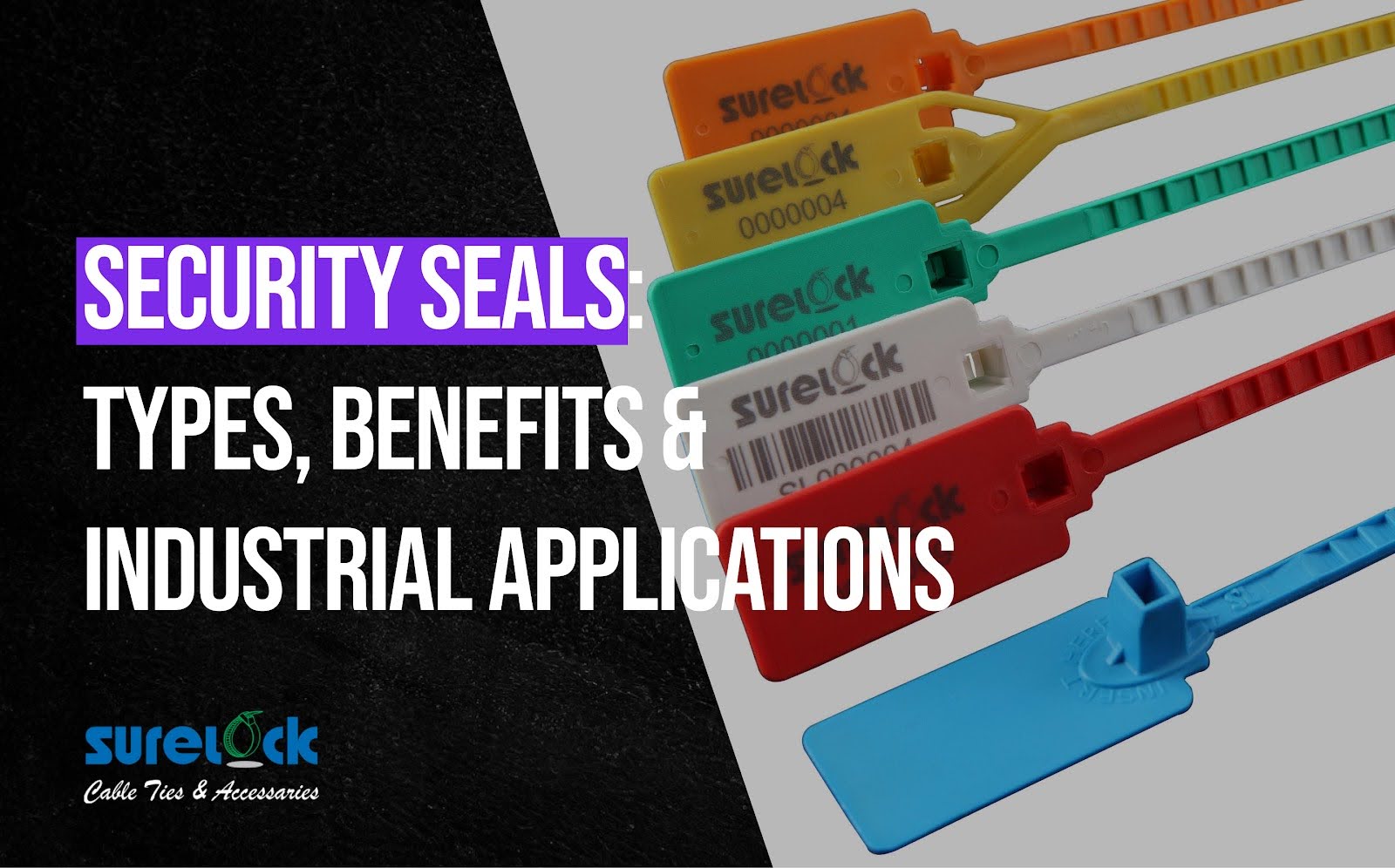
If you're managing large-scale operations, whether in automotive manufacturing, telecom infrastructure, oil and gas facilities, or electrical assembly, you know how critical it is to keep assets secure and compliant.
Tampering, theft, and operational delays aren’t just risks, they’re everyday concerns. That’s where security seals come in. These small but powerful tools help prevent unauthorized access, protect equipment, and support traceability across your supply chain.
With growing demand across industries, it’s no surprise that the global security seals market, valued at $1.1 billion in 2022, is expected to reach $2.4 billion by 2031, growing at 7.3% annually.
In this blog, we’ll cover everything from what security seals are and their key benefits to the most common types used today. You’ll also learn about their role in different industries, how to choose the right seal and common issues businesses face, along with solutions.
Whether you're in manufacturing, procurement, or facility management, this guide helps you make informed decisions and strengthen operational control.
Quick Summary
- Security seals help prevent tampering, theft, and unauthorized access across supply chains.
- Common types include cable seals, light-duty, heavy-duty, and double-lock seals, each suited for specific applications.
- Benefits include tamper evidence, product integrity, compliance, traceability, and operational efficiency.
- Widely used in industries like automotive, telecom, oil & gas, pharmaceuticals, and logistics in India and globally.
- Surelock has offered certified, customizable sealing solutions trusted by manufacturers and managers since 1998.
What Are Security Seals?
Security seals are tamper-evident devices used to lock, seal, or secure containers, equipment, or packaging in a way that shows visible evidence if access has been attempted or compromised. They are typically single-use and designed to enhance security, prevent unauthorized interference, and ensure the integrity of goods during handling, storage, or transport.
With a clear idea of what security seals are, the next step is to look at the practical benefits they offer in real-world applications.
Key Benefits of Security Seals
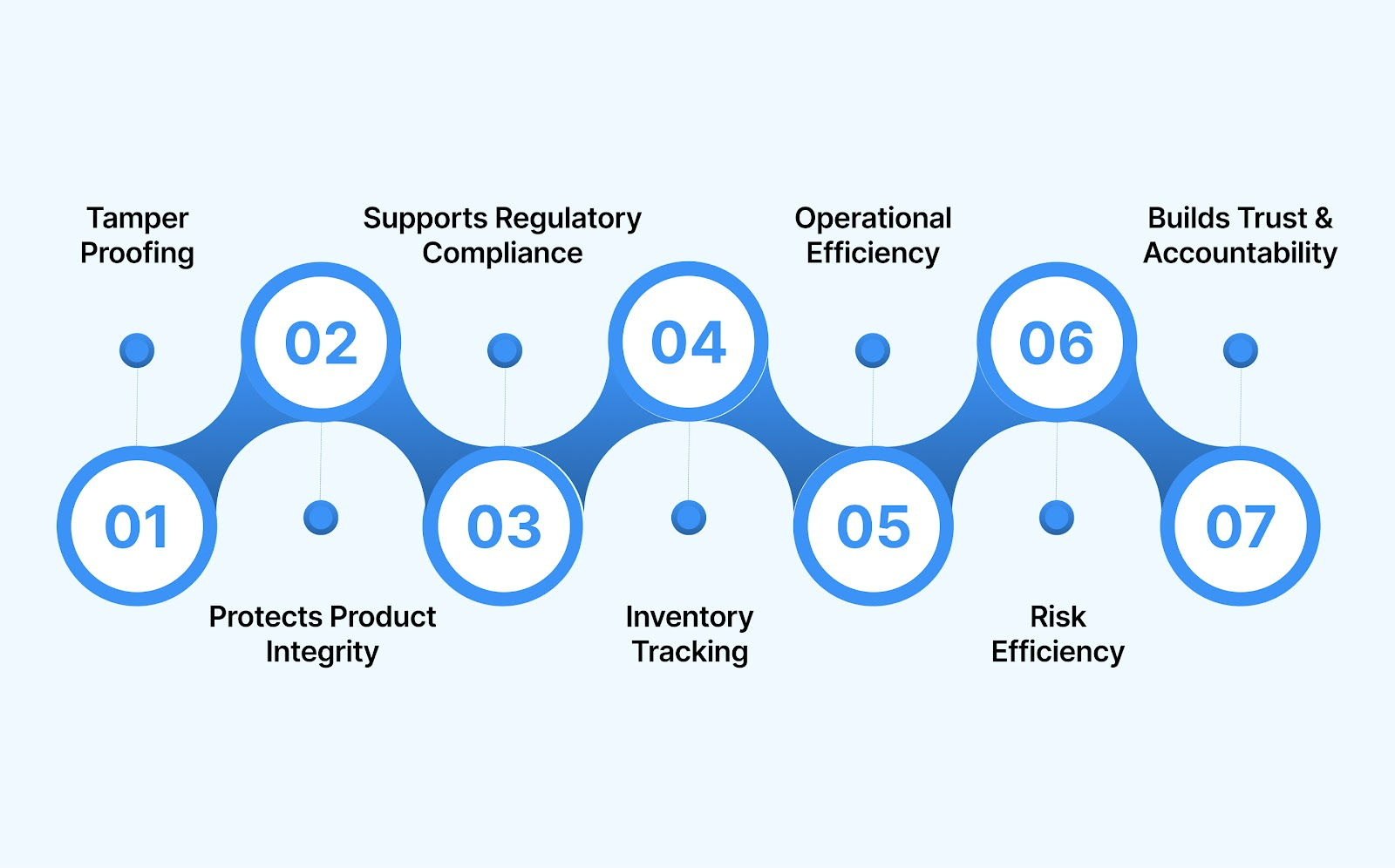
When you implement security seals in your operations, you unlock several valuable advantages that help protect your assets and improve efficiency.
Here are the key benefits of security seals:
- Clear Tamper Evidence and Deterrence: Security seals offer visible proof if anyone tries to access or tamper with your goods. This visible evidence helps deter theft and unauthorized interference by increasing the risk of getting caught.
- Protects Product Integrity: Seals keep products secure and uncontaminated from the moment they leave your facility until they reach their final destination, ensuring they remain in their original condition.
- Supports Regulatory Compliance: Seals with unique serial numbers or barcodes help you meet industry regulations by maintaining a proper chain of custody and making audits easier.
- Improves Tracking and Inventory Control: Identifiable seals simplify the process of tracking items through the supply chain, helping reduce losses and improve inventory management.
- Enhances Operational Efficiency: Security seals are quick and easy to apply and remove, which minimizes delays during production and inspections and saves labor time.
- Cost-Effective Risk Management: Security seals offer an affordable way to reduce risks related to theft, tampering, or damage, protecting your assets with minimal upfront cost.
- Builds Trust and Accountability: Using security seals demonstrates your commitment to security and transparency, helping build trust with your employees, partners, and regulators.
Once you're clear on why security seals matter, it’s time to explore the different types available and how each one is designed for a specific operation.
Also read: Top Zip Ties for All Uses: Selection and Buying Guide
Common Types of Security Seals
Security seals are available in a variety of forms, each designed to provide dependable tamper-evident protection for your equipment and shipments. Choosing the appropriate seal ensures your assets stay secure from start to finish.
Below are the most widely used types of security seals, each providing different features:
1. Cable Seals
Cable seals feature a flexible, high-tensile galvanized steel cable combined with a durable aluminum alloy casing. This design offers excellent strength, resistance to corrosion, and tamper protection, making it ideal for tough environments.
Features:
- Commonly used to secure containers, trailers, truck doors, warehouses, refineries, and storage tanks.
- Constructed with an aluminum alloy casing and non-preformed galvanized steel cable.
- The cable unravels when cut, preventing any attempt to reseal.
- Available in red, blue, green, black, orange, and white, with custom colors on request.
- Packaging sizes: 200 mm & 250 mm (500 seals per carton), 250 mm to 400 mm (250 seals per carton).
- Features a unique locking system that ensures tamper-proof security.
- Robust design ideal for protecting valuable cargo.
- High-precision laser marking enhances security.
- Certified according to ISO 17712:2013 and C-TPAT standards.
2. Light-Duty Security Seals
Light-duty security seals are perfect for everyday sealing needs like doors, bags, and drums. They offer dependable tamper evidence for general applications.
Features:
- Made of durable nylon or polypropylene materials.
- Standard colors include red, yellow, blue, green, orange, and white; custom colors are available.
- Suitable for use in temperatures ranging from -40°C to +85°C.
- Supplied in packs of 100 pieces.
- Employs a self-locking, single-point locking design activated by inserting a serrated strap.
- Strap length is adjustable to fit different diameters.
- Features an identification tag with space for laser marking logos or serial numbers.
- Fully recyclable and contains no metal components.
3. Heavy-Duty Security Seals
Heavy-duty security seals are built for more demanding conditions where extra strength and durability are necessary to secure doors, drums, or bags.
Features:
- Manufactured from nylon or polypropylene.
- Available in a variety of standard and custom colors.
- Performs reliably between -40°C and +85°C.
- Packaged in 100-piece sets.
- Uses a self-locking, single-point locking mechanism to ensure tamper evidence.
- Strap length can be adjusted to fit various diameters.
- Large tag area designed for laser engraving.
- Metal-free and recyclable.
4 .Double Lock Seal Light Duty
Double lock seals in the light-duty category provide added security with a dual-locking feature, perfect for doors, bags, and drums needing clear tamper resistance.
Features:
- Constructed from nylon or polypropylene.
- Available in standard colors, with custom options on request.
- Effective temperature ranges from -40°C to +85°C.
- Supplied in packets of 100 pieces.
- Features a self-locking design with single-point locking for easy use.
- Adjustable serrated strap fits different diameters.
- Includes an identification tag for laser marking.
- Metal-free and fully recyclable.
5. Double Lock Seal Heavy Duty
The heavy-duty double lock seal adds even more locking strength and durability, suited for industrial uses like securing bags, drums, and access doors.
Features:
- Made from premium nylon or polypropylene.
- Available in all standard colors and custom options.
- Performs well within -40°C to +85°C.
- Packaged in sets of 100 seals.
- Dual-locking, self-securing mechanism provides strong tamper resistance.
- Adjustable strap length for versatile applications.
- The tag area allows for clear laser marking.
- Fully recyclable and metal-free.
6. Adjustable Pull-Up Strap Seal
This seal offers easy, flexible locking on doors, bags, and drums using a conventional self-locking strap.
Features:
- Made from nylon or polypropylene.
- Available in standard and custom colors.
- Functions effectively in temperatures from -40°C to +85°C.
- Supplied in packs of 100 seals.
- Uses a conventional self-locking, single-point locking system.
- Strap length is adjustable to suit various sealing needs.
- Fully recyclable with no metal parts.
7. Adjustable Ball Pull-Up Seal
The adjustable ball pull-up seal locks door handles, drums, and bags with a flexible, strong ball-type locking system.
Features:
- Made of nylon or High-Density Polyethylene (HDPE).
- Offered in red, yellow, blue, green, orange, and white, with custom colors available.
- Reliable performance from -40°C to +85°C.
- Supplied in 100-piece packs.
- Features a cone-ball adjustable locking mechanism for variable diameter needs.
- The acetal insert provides tamper-proof locking.
- Metal-free and recyclable.
8. Door Lock Seal
Door lock seals are designed specifically for vehicle doors, providing strong tamper evidence with dual locking points.
Features:
- Made from nylon or polypropylene.
- Available in standard colors, with custom options.
- Operates within a temperature range of -40°C to +85°C.
- Packaged in sets of 100.
- Features two locking points for strong tamper evidence.
- The locking mechanism is fully enclosed once the strap is inserted.
- Environmentally friendly and metal-free.
9. Mini Ball Pull-Up Seal
\
Mini ball pull-up seals are ideal for light-duty sealing of small boxes, compartments, and bags where a lower breaking strength is acceptable.
Features:
- Made from nylon or polypropylene.
- Available in standard colors and custom options.
- Suitable for temperatures between -40°C and +85°C.
- Supplied in 100-piece packets.
- A slim strap fits into tight spaces.
- Cone-ball design offers adjustable length and secure locking.
- Acetal insert prevents tampering.
- Available with plain or tear-off tags; no tools needed for removal.
- Supplied in strips of 10 seals to reduce plastic waste.
- Fully recyclable and metal-free.
10. Metal Lock Security Seal Small Tag
Metal lock security seals are suited for high-security, tamper-evident sealing on bags and containers.
Features:
- Made from polypropylene with a metal insert lock.
- Available in standard and custom colors.
- Effective from -40°C to +85°C.
- Supplied in packs of 100 seals.
- Metal insert ensures a strong, secure lock.
- Ultrasonic welding increases tamper resistance.
- Gripping spikes secure the seal on canvas or plastic surfaces.
- Delivered in strips of 5 seals to minimize plastic waste.
11. Beaded Releasable Tie
Beaded releasable ties provide a reusable, eco-friendly solution for temporary bag sealing.
Features:
- Made of nylon or polypropylene.
- Available in all standard colors, with custom options.
- Withstands temperatures from -40°C to +85°C.
- Supplied in 100-piece packs.
- Self-locking beaded design.
- Can be released and reused multiple times.
- Special grooves secure excess strap length.
- Metal-free and fully recyclable.
When it comes to choosing security seals you can trust, Surelock stands out as a leading Indian manufacturer offering a wide range of high-quality cable ties, security seals, and wiring accessories.
Whether you need light-duty, heavy-duty, double-lock, adjustable ball pull-up, metal lock, or cable seals, Surelock provides durable and reliable solutions tailored to meet your specific security requirements. With Surelock seals protecting your goods every step of the way, you can ensure tamper-evident security and peace of mind throughout transit.
With the right seal in place, your next concern is where and how to use it effectively. Below are some of the most common industrial use cases.
Industrial Applications and Uses of Security Seals
Security seals play a vital role across many industries by providing visible protection against tampering, theft, and unauthorized access. From transportation to manufacturing, these seals help safeguard your assets, maintain compliance, and ensure smooth operations throughout the supply chain. Below is the table of common industrial applications and uses of security seals.
Now that you’ve seen where security seals are commonly used, the next step is understanding how to pick the right one for your specific application.
Also read: Best Security Seals for Aviation: Best Applications in Airline Industry Security
How to Choose the Right Security Seal
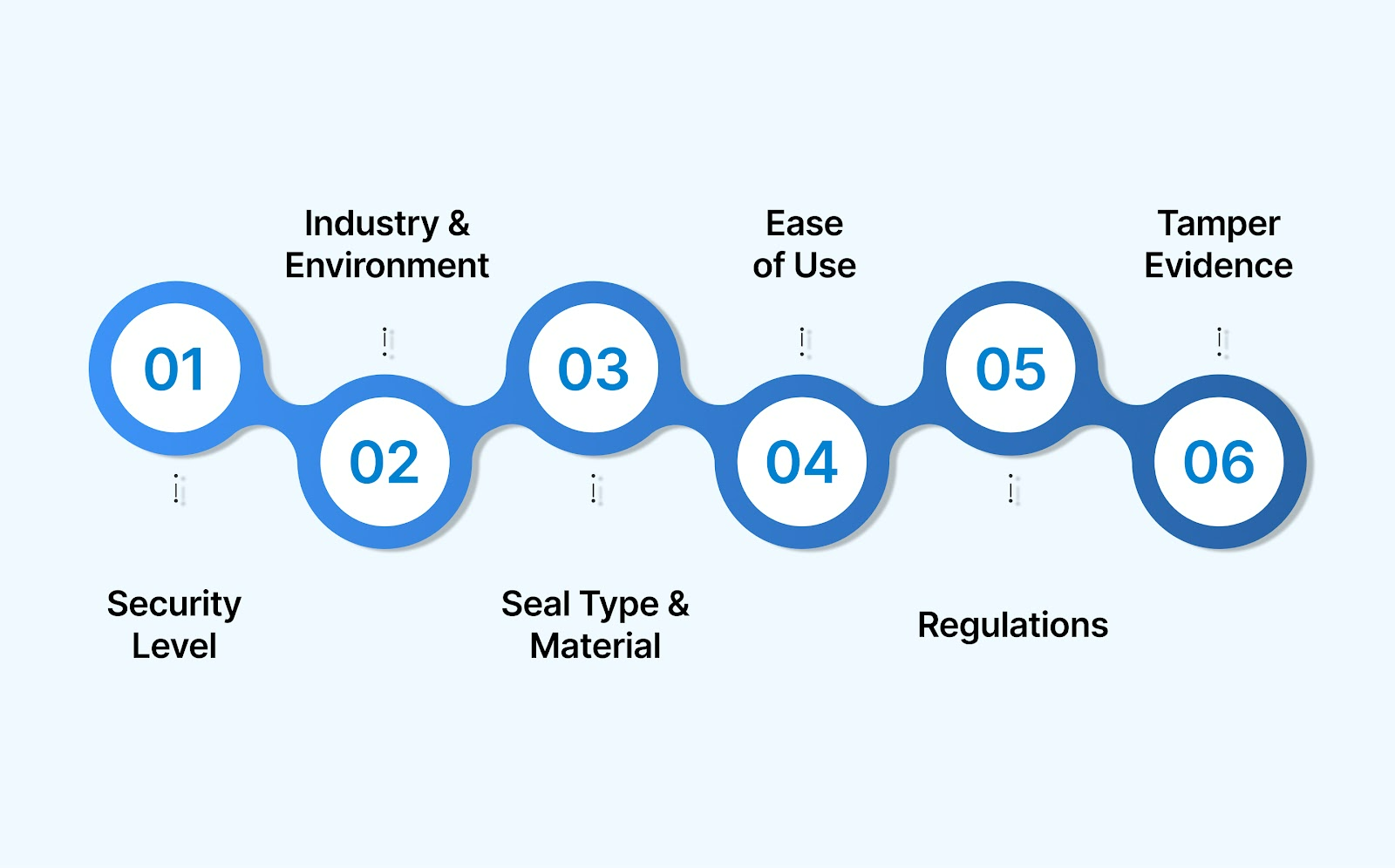
Selecting the right security seal is essential to ensure effective protection, operational efficiency, and compliance with industry standards. Here are the key factors to consider when making your choice.
- Security Level: Use metal seals like bolts, cables, or strap types for high-value or sensitive shipments. For regular packaging, plastic pull-tight or adhesive seals are cost-effective. Electronic seals with RFID or GPS offer instant tracking and tamper alerts.
- Industry and Environment: Plastic and cable seals fit automotive and electrical use. For harsh sites, use stainless or metal seals. Telecom needs weatherproof, tamper-evident options.
- Seal Type and Material: Plastic seals are lightweight and cost-effective. Metal and bolt seals provide strong, long-term security. Cable seals fit odd shapes and add extra protection.
- Ease of Use: Choose seals your team can handle; some need tools like bolt cutters, others, like plastic pull-tight seals, can be applied by hand. Also, decide if you need single-use seals for compliance or reusable ones to save costs.
- Regulations: Make sure seals meet standards like International Organization for Standardization (ISO)/Publicly Available Specification (PAS) 17712 and any industry rules, especially for cross-border shipments.
- Tamper Evidence: Pick seals that clearly show tampering through breakage or permanent marks. This helps you spot unauthorized access fast.
Surelock provides seals that can handle extreme temperatures, UV exposure, fire hazards, and heavy mechanical stress. You can also customize them to suit your industry, whether it’s automotive, telecom, or something else.
While selecting the right seal is important, it’s equally crucial to be aware of the challenges that may come up during real-world use and how to handle them effectively.
Common Challenges with Security Seals and Their Solutions
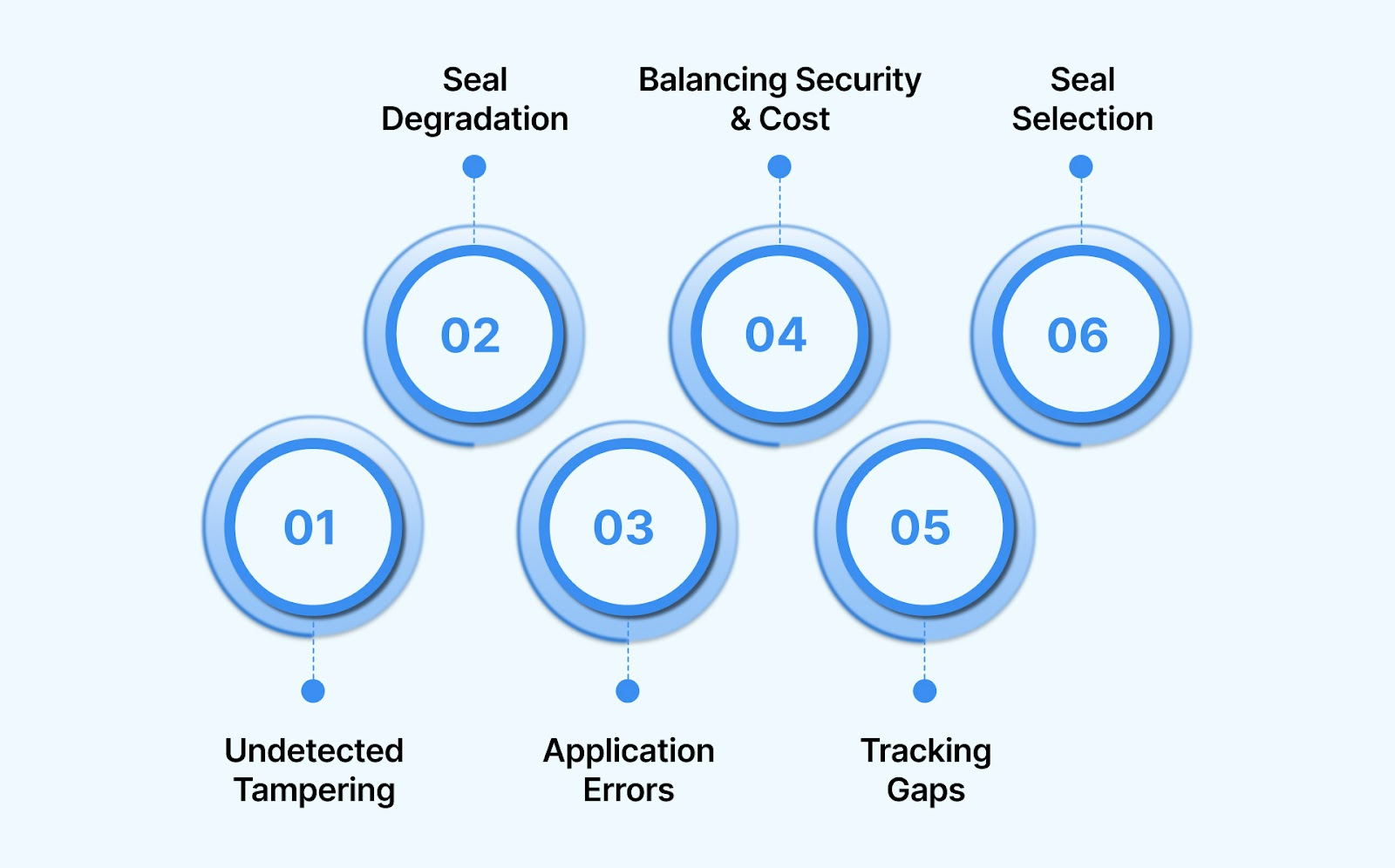
Even the most reliable security seals can face real-world challenges, whether it’s tampering, rough environments, or improper use. The following are common issues businesses face with security seals and practical ways to overcome them.
- Challenge: Tampering Without Being Noticed
- Solution: To prevent unnoticed tampering, use high-security bolt or cable seals with tamper-evident materials and unique codes. For high-risk goods, go for electronic seals with real-time alerts.
- Challenge: Seal Damage in Harsh Environments
- Solution: Environmental conditions can affect seal performance. For outdoor or tough settings, go for UV-resistant plastic or corrosion-resistant metal seals. Always ensure the seals are tested and rated for durability to suit the surroundings where they’ll be used.
- Challenge: Incorrect Application or Removal
- Solution: Improper use can reduce a seal’s effectiveness. Make sure your team is trained on how to apply and remove seals correctly. Easy-to-use designs like pull-tight or double-lock seals help minimize errors during day-to-day operations.
- Challenge: Balancing Security and Cost
- Solution: Every sealing need doesn't require the highest level of protection. If you're working with low-risk items, plastic seals can offer reliable tamper evidence at a lower cost. For goods that need stronger protection, investing in heavy-duty bolt or cable seals is a smarter choice.
- Challenge: Poor Tracking and Recordkeeping
- Solution: Without proper traceability, it’s hard to manage seal use effectively. Choose serialized seals and connect them with digital tracking systems to keep clear records. This helps improve transparency and supports compliance requirements.
- Challenge: Choosing the Right Seal for the Job
- Solution: Not every seal fits every use. It's important to match the seal type to your specific packaging or transport needs. Whether it’s for small packages, bulk containers, or high-value items, using the right seal improves overall security and handling efficiency.
Conclusion
Security seals play a vital role in keeping your goods safe, showing clear signs of tampering, and helping you stay compliant with industry standards. Whether you're in automotive, telecom, pharmaceuticals, oil and gas, or logistics, using the right seal makes a real difference in day-to-day operations, from reducing risk to improving accountability across your supply chain.
If you're looking for a trusted sealing partner, Surelock is one of India’s leading manufacturers and suppliers of security seals. Since 1998, the company has been serving industries with a wide range of light-duty, heavy-duty, and cable seals, designed to handle real-world challenges. With ISO 9001:2015 and BSI certifications, and a strong focus on quality, Surelock offers reliable, customizable solutions that meet both Indian and global requirements.
Contact us for customized solutions that fit your business needs and help you protect what matters most.
Frequently Asked Questions (FAQs)
1. Where are security seals commonly used?
They’re used in logistics to seal cargo, in automotive and construction for equipment, in telecom to protect devices, and in pharma to secure medicine containers. Utilities also use them on gas, water, and electricity meters.
2. What types of security seals are suitable for different needs?
Plastic pull-tight seals are used for bags and boxes. Cable and bolt seals are stronger, best for containers and trucks. Metal clip seals are used in the postal and utility sectors. Indicative seals are for basic tamper alerts.
3. How do security seals benefit business operations?
They show tampering, reduce theft, support compliance, are cost-effective, and save time during handling or shipping.
4. Can they be used on emergency or special equipment?
Yes. Seals are often used on fire extinguishers, first aid kits, and similar tools. They ensure the item is unused but still allow quick access when needed.
5. Are they helpful for protecting records or sensitive data?
Yes. In places like hospitals or offices, seals help keep files and documents secure from unauthorized access.
